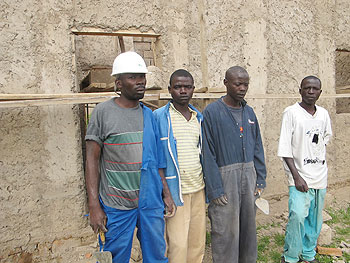Two years ago, the Iwawa Rehabilitation and Vocational Skills Development Centre (IRVSDC) was established by the government of Rwanda to impart life skills to street children. Amidst criticism, from foreign media outlets who likened the centre to a prison—‘Alcatraz of Rwanda’ and the ‘Island of no Return”—a lot has changed.


Two years ago, the Iwawa Rehabilitation and Vocational Skills Development Centre (IRVSDC) was established by the government of Rwanda to impart life skills to street children. Amidst criticism, from foreign media outlets who likened the centre to a prison—‘Alcatraz of Rwanda’ and the ‘Island of no Return”—a lot has changed.
On May 18, 2011 the first students of Iwawa graduated with 253 completing courses in Construction, 157 in Bee Keeping, 156 in Commercial Farming, 108 in Carpentry and 101 in Tailoring. The students were also taught basic business skills and languages used in Rwanda which included English and Kiswahili as well as Mathematics.
Before graduating, the Government had put in place mechanisms to ensure that the rehabilitated youth are employed and had access to credit to start up income generating activities with the skills they had attained.
One of the students, Jean Lapaix Mariabaseka also known as ‘Pastor’, is grateful for the psychological support he got and renounced his former street lifestyles.
"Besides the skills I attained in the construction field, I currently value my lessons in patriotism, religious and society principles. Before I was taken to Iwawa, I didn’t have a clue about my future but now before I make any decision, I first give it a lot of thought,” Mariabaseka expresses.
He adds that he is happy that he currently lives a responsible life free of alcohol and cigarette smoking.
The 34-year-old Mariabaseka was married with two children before he was taken to Iwawa where he spent a year and four months. His family had to look after his wife and children although, unfortunately, his wife re-married.
"While I was away a lot of issues affected my family and my wife had to leave. I respected her decision to remarry, I also got another partner and I am looking after my two children. One of the children has to begin school next year so I’m working hard to make ends meet,” Maria baseka discloses.
Mariabaseka said he earns Rwf60,000 monthly. He and 14 other students from Iwawa, are constructing houses in Nyamirabo Sector for ‘Ibuka’ orphans and survivors of the 1994 Genocide against the Tutsi.
"I was given a second chance in life when I was taken to the island because there was no place that could give me what I have besides the trainings I got from there. I advise the students at Iwawa to focus on what they are taught because it will help them make it in life,” Mariabaseka emphasizes.
Although Maraibaseka is living his dream, a few grandaunts are not practicing in their earned profession.
Samson Hategekimana, also graduated from Iwawa in Bee Keeping, says he longs to use his bee-keeping skills to make money.
"Although I’m working at the construction site as a porter, in no time I will have forgotten what I learnt bee keeping, if I don’t start soon. I chose bee keeping because I thought it was unique and not a very competitive field. However, I lack equipment to start my dream job,” Hategekimana expresses.
He further adds that the Rwf1,500 he earns daily as a porter is not enough for all that is required to make ends meet.
Even though they lack the equipment to venture into their fields of study, these youth can construct a double bedroomed, self-contained house each with three bedrooms in a period of three weeks.
Serge Guillaume Nzabonimana, Advisor to the Minister of Youth, Sports and Culture, said that each district has the mandate to provide the Iwawa grandaunts in their areas with equipment.
"The youth who graduated are supposed to deal with District personnel in their home areas so that they practice the skills they learnt. There have been some adjustments made at the IRVSDC regarding the trainings the youth are supposed to acquire,” Nzabonimana explains.
He adds that three of the vocational trainings, which include tailoring, carpentry and construction will be optional for the students at the Iwawa Rehabilitation and Vocational Skills Development Centre.
"Previously, students would be trained in one of the five courses which were tailoring, carpentry construction, bee keeping and commercial farming but, today, bee keeping and commercial farming are compulsory subjects,” Nzabonimana.
Nicolas Niyongabo, Coordinator at IRVSDC, explains the integration process of the youth, vback to society after graduating.
"The Vice Mayor in charge of welfare in each District is supposed to integrate the youth that graduate from the center. In fact, the youth have formed cooperatives which are meant to address their problems,” Niyongabo discloses.
He also said that the ongoing activities amongst the Iwawa grandaunts will be acknowledged when the youth meet with one another and discuss ways in which they can improve their cooperatives.


